
Have you been under the impression that customer experience (CX) and user experience (UX) are one and the same?
After all, all customers are users, and so therefore, the user experience also means customer experience, right? In fact, they are fundamentally different. But do not worry; you are not alone, as most people believe the same.
To put it simply, customer experience (CX) relates to every point of interaction a user will have with your brand or product, while user experience is specifically how the user interacts with your design. For example, a marketing email is part of the customer journey outside of your UX design.
However, you will see them used interchangeably by businesses, software developers, and apps. Let us see how they both differ.
Do your customers a favor! Start our FREE TRIAL!

CX: Customer experience
Customer experience is a broad concept where it focuses on what your customer will experience throughout the sales funnel, i.e., the first interaction to making a purchase and after-sales services.
This is not only about the quality of your product but how the customer felt at each stage. This includes how a customer progressed from being a visitor to building an emotional bond with your business and buying a product.
For example, if you are a business offering software, the software does not represent your entire business. This also means that what services the software provides does not define the complete customer experience.
Your customer experience (CX) occurs through several channels such as:
- Advertisement
- Social media pages
- Marketing campaigns and materials
- Sales process
- The price tag
- Customer services
- Product quality
The collective experience of all the above-mentioned aspects of your business defines the CX of your brand. When you are working on designing a good customer experience (CX), you aim to focus on how your customers perceive your brand as a whole and now just for the product.
You can measure your CX on the following metrics:
- Overall satisfaction of the customers
- The willingness of the customers to recommend your brand
- The loyalty of the customer by preferring your brand over others

UX: User experience
UX focuses on your user’s perception of a specific product or service. The concept of user experience is to focus on how your customer will interact with your product. Therefore, you work on your product’s design, its interactions, its interface, etc.
Creating a user-friendly, visually attractive and informative persona around a product creates a positive user experience to encourage them to buy.
If you wish to create an effective user experience, these are the areas you must focus on:
- Designing intuitive and interactive products or services
- Ease of use
- Designing a product or service that offers a solution to customer’s problems
- Designing an ethical product
Testing for your UX means running usability tests. These involve quantitative and/or qualitative data collection. Quantitative data is all about hard data points, while qualitative data is more about the subjective insights of user feedback (via narration and post-test surveys). Both are vital to a healthy, successful product and inform smart design decisions, and neither are JUST the GUI.
Trymata even has the exclusive ability to help quantify qualitative data. We call it the UX Crowd.
You can also measure your UX design with some of the following metrics:
- The success rate, i.e., the percentage of users who buy the product and reach a goal or stage you wish them to reach within your product or services
- The error rate, i.e., the number of mistakes a user makes while completing a task
- The total time it takes for your user to complete a specific task
- The number of clicks user perform before completing a task
- Rate of abandonment, i.e., how many users abandon the task before completing it
In terms of usability testing, there are many other user testing platforms put there that offer virtually NO quantitative metrics, or put them behind extravagant paywalls.
Trymata boasts a comprehensive quantitative toolset included in our free trial.

Conclusion
While CX and UX are obviously different, they share certain aspects to complement each other’s success. At the end of the day, whether it is the customer experience or user experience, your goal as a company should be to create a positive experience to attract, entice, engage and retain the customers and users. This can begin in an ad somewhere online, or can begin directly with your product.
Remote usability testing tools, both moderated and unmoderated, are extremely insightful for evaluating both your CX and your UX. While the usability testing strategies may differ somewhat, the focus is the same: understanding your user (and/or customer).



